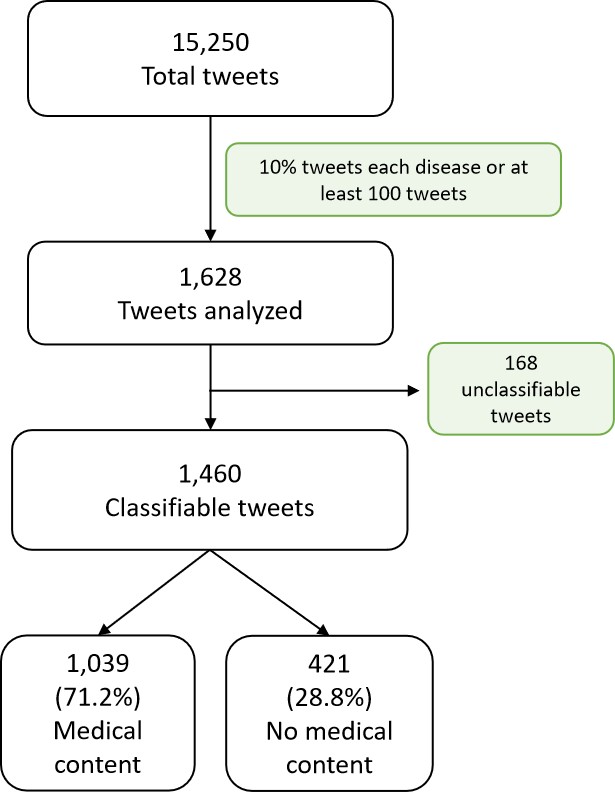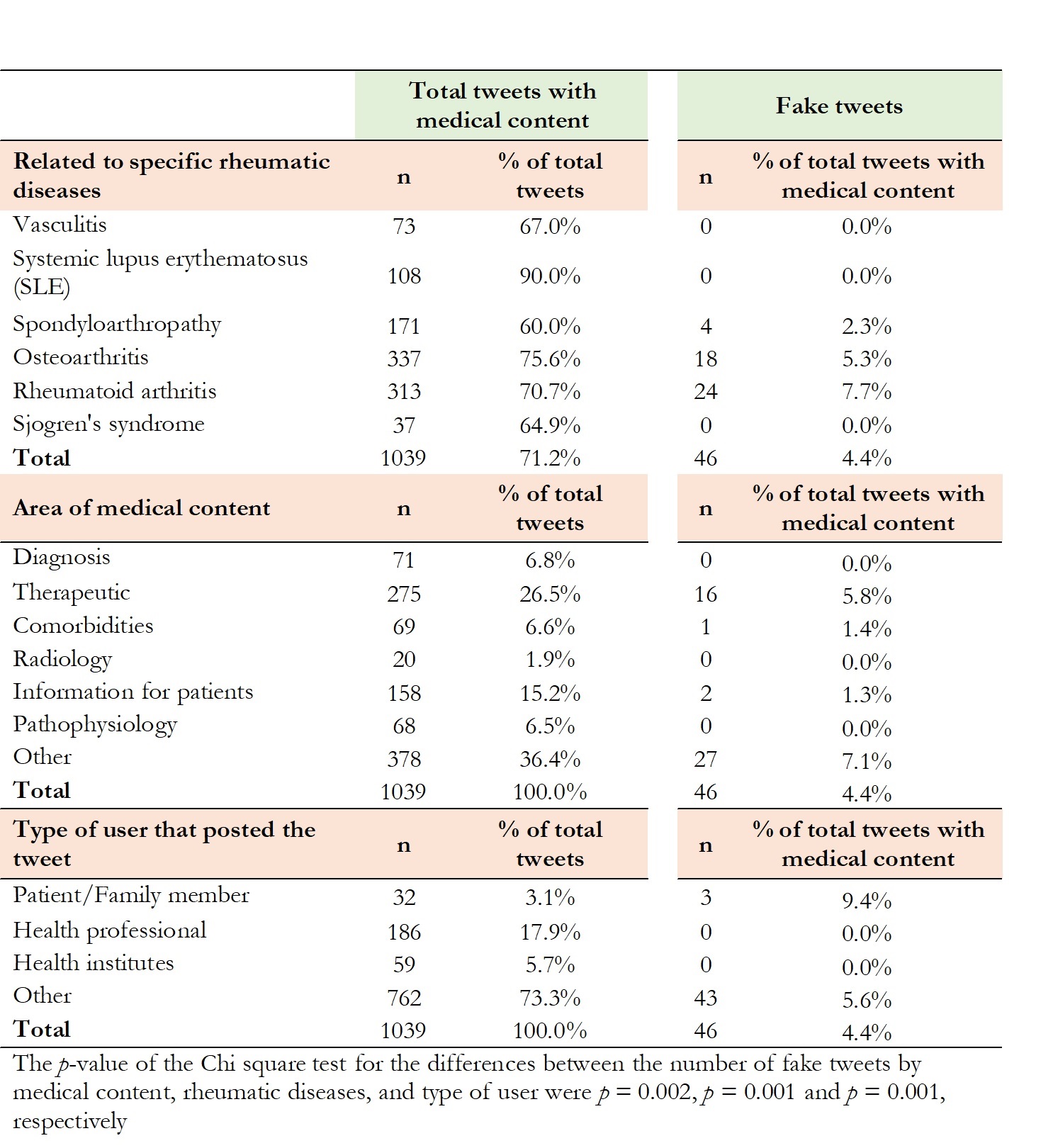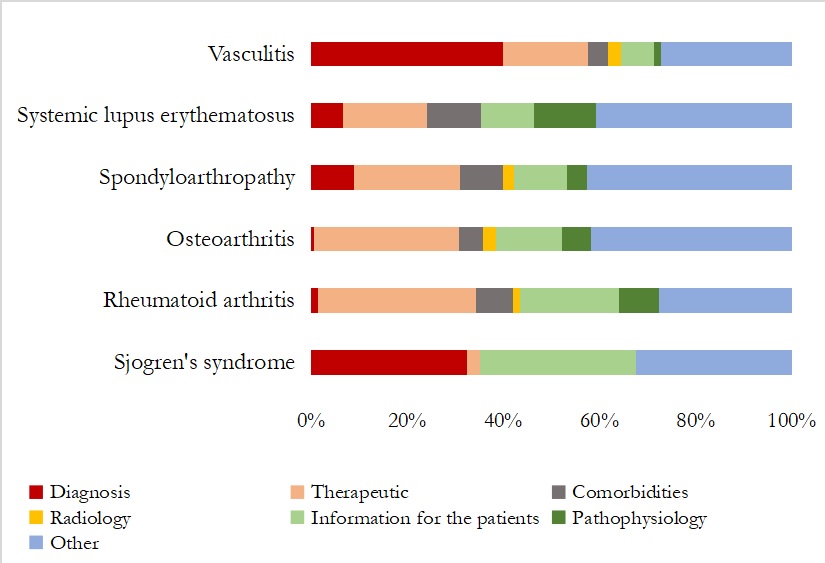Session Information
Date: Monday, November 8, 2021
Title: Health Services Research Poster II: Care Models and Innovation (1061–1082)
Session Type: Poster Session C
Session Time: 8:30AM-10:30AM
Background/Purpose: Twitter is an indicator of the interests of its users in the real world, and therefore, is an appropriate setting to assess the content on rheumatological diseases related tweets. The objective of this research was to analyze the content of the tweets referring to rheumatological diseases.
Methods: We analyzed the content of the tweets published between the 25 of January and 20 February, 2020, in English or Spanish, out of six rheumatological diseases: vasculitis, systemic lupus erythematosus (SLE), rheumatoid arthritis (RA), Sjögren’s syndrome (SS), osteoarthritis (OA) and spondyloartopathies, including spondylitis, ankylosing spondylitis, psoriatic arthritis and reactive arthritis. At least 10% of tweets were randomly selected from each disease. It was classified as medical content (diagnosis, treatment or other aspects of the disease) or non-medical (conversation between users, request for help, etc.). It also has been evaluated the type of user and the suitability of the medical content -appropriate or fake.
Results: 15,250 original tweets were published, selecting 1,628: 1,093 classified as medical, 421 as non-medical and 168 as unclassifiable (Figure 1). We analyzed a total of 1,039 tweets: 1,093 classified as medical and 421 as non-medical.
As shown in Table 1, medical tweets related to RA and OA accounted for 62%, followed by tweets regarding SpA.
Next, we investigated the content of the tweets (Table 1 and Figure 2). Concerning the specific medical contents, it was found that most of the tweets were related to the treatment of the disease (26.5%) followed by information for patients (15.2%). The percentage of tweets with contents referred to the diagnosis, comorbidities and pathophysiology were minor. Within the medical tweets, the content of these varied according to the disease. The specific analysis of the type of medical content among the investigated diseases showed a significative heterogenous distribution (p< 0.001). Contents related to diagnosis were mainly observed in those of vasculitis and SS, and were marginal in those of OA and RA. In contrast, the percentage of treatment related tweets were markedly elevated in those of OA and RA and minimum in those of SS.
Finally, we analyzed the fake content of the tweets (Table 1). Interestingly, a low percentage of tweets with fake content regarding RA, OA and SpA was observed. Furthermore, it was observed that the content of theses fake tweets was mainly focused in the treatment of the diseases. In fact, 5.8 % of the tweets related to treatment showed wrong information. The fake content came from unidentified users. Notably, no fake tweets were encountered among those posted by health professionals or health institutions.
Conclusion: The data show that the interest of Twitter community in rheumatic diseases is high according to the number of tweets. The diseases with more tweets were the most prevalent. Given the interest raised by medical content posted on Twitter, the involvement of health institutions and health care providers in medical related conversations over social media appears to be desirable. However, the content posted by healthcare professionals is always appropriate, although there is some spreading of fake content by unidentified users.
 Figure 1. Flowchart illustrating the process followed for the analysis of the tweets, along with the number of tweets included and excluded.
Figure 1. Flowchart illustrating the process followed for the analysis of the tweets, along with the number of tweets included and excluded.
 Table 1. Number of tweets with medical contents and of those with fake information related to the rheumatic diseases.
Table 1. Number of tweets with medical contents and of those with fake information related to the rheumatic diseases.
 Figure 2. Proportion of the different medical contents among the tweets related to each rheumatic disease.
Figure 2. Proportion of the different medical contents among the tweets related to each rheumatic disease.
To cite this abstract in AMA style:
abbasi A, Álvarez-Mon M, Donat-Vargas C, Perez a, suarez j, montano l, rico e, Alvarez de Mon m. Analysis of Tweets Containing Information Related to Rheumatological Diseases on Twitter [abstract]. Arthritis Rheumatol. 2021; 73 (suppl 9). https://acrabstracts.org/abstract/analysis-of-tweets-containing-information-related-to-rheumatological-diseases-on-twitter/. Accessed .« Back to ACR Convergence 2021
ACR Meeting Abstracts - https://acrabstracts.org/abstract/analysis-of-tweets-containing-information-related-to-rheumatological-diseases-on-twitter/
